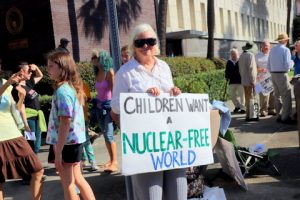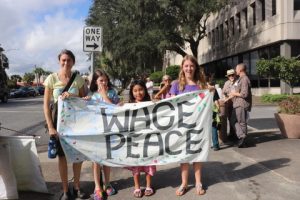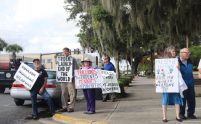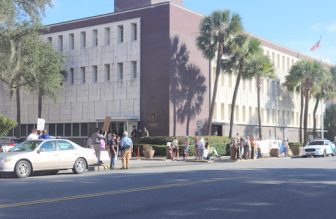
The Plowshares activists from L to R: Carmen Trotta, Clare Grady, Patrick O’Neill, Elizabeth McAlister, Martha Hennessey, and Mark Colville. Patrick O’Neill is holding a photo of Fr. Steve Kelly who is still incarcerated. (all photos: The Nation Report)
BRUNSWICK, Georgia – Known as the Kings Bay Plowshares 7, seven peace activists are on trial after being arrested in 2018 for entering the Naval Submarine Base Kings Bay in southern Georgia. The group say they wanted to “nonviolently disarm nuclear weapons.”
The seven chose to carry out their action on April 4, 2018, the 50th anniversary of the assassination of Dr. Martin Luther King Jr. they say, as a symbolic gesture to address King’s statement against the “triple evils of militarism, racism, and materialism.”
The activists entered Kings Bay nuclear storage bunkers, the Strategic Weapons Facility Atlantic Administration building, and the Trident D5 monuments where they left crime tape and poured their blood from baby bottles onto the property. They hung banners that read: “The ultimate logic of racism is genocide – Dr. Martin Luther King”, “The ultimate logic of Trident is omnicide” and “Nuclear weapons: illegal / immoral.”
Similar actions have been taken by themselves and other peace activists for decades across the country, also in attempt to raise awareness about the potential dangers of nuclear arms and for a ban on nuclear weapons.
The group has been open and public about their preparation and intention since their arrests, acknowledging step-by-step actions that they took. And each has expressed a knowledge of the risk of arrest and judicial ramifications that could follow.
Arrested were Mark Colville, New Haven, Connecticut; Clare Grady, Ithaca, New York; Martha Hennessy, New York; Fr. Steve Kelly, Bay Area, California; Elizabeth McAlister, Baltimore, Maryland; Patrick O’Neill, North Carolina; and Carmen Trotta, New York.
All face up to 25 years on three felony counts and one misdemeanor: conspiracy, trespass and destruction and depredation of property.
Fellow activist Paki Wieland traveled from Washington DC to support the Kings Bay Plowshares 7 with whom she said she has joined in other actions at different locations as a “co-conspirator,” as her way of denouncing the conspiracy charge. Weiland took issue with common interpretation of the term, “It’s certainly been used more lately as this terrible thing that people conspire together to do bad things, but the root of conspiracy is ‘breathing together.’ And that’s what I feel this community of resistance is doing.”
Weiland has participated in a Witness Against Torture action with defendant Martha Hennessey, and with Clare Grady having been arrested for resisting drone warfare at the Hancock Drone Base in Syracuse, New York.
“I see it as much beyond what we’re seeing right now. It’s everybody here supporting them. It’s every one of our communities of resistance back home.”
Sheila Stump of Ghent, New York also took issue with public and media attention to peace actions, “What bothers me most is this idea of the criminality placed on the wrong issues. Right now the burden is placed on the action to disarm these weapons of mass destruction is the criminal act, when in fact, the weapons of mass destruction that have the potential to destroy the world is the criminal act.”
The Kings Bay Naval Base maintains ballistic missile nuclear submarines that are capable of launching Trident missile nuclear weapons. The submarines are powered by a nuclear reactor, and the Trident missiles carry thermonuclear warheads.
Trident missiles were originally developed by Lockheed Missiles and Space Corporation, and in 2002 the US Navy awarded Lockheed Martin Space Systems-Missiles & Space Operations a $248 million contract for production of 12 TRIDENT II D5 Fleet Ballistic Missiles (FBM). This was the start of several similar contracts to be awarded for production of more D5 missiles and for the retrofitting of existing missiles.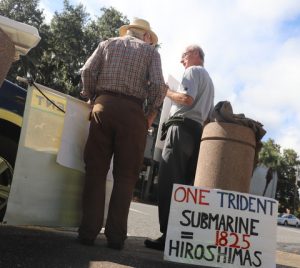
The first Trident submarine, the USS Tennessee, arrived at Kings Bay on January 15, 1989, and the USS Louisiana in September 1997, for a total of 10 Trident submarines. It is the largest nuclear submarine base in the world. There are six ballistic missile subs and two guided missile subs based at Kings Bay.
On Friday, Judge Lisa Godbey Wood ruled against a motion to use expert witnesses who would have entered a necessity defense or international law defense into testimony. Activist Mark Colville expanded on the international law defense in a press release, ““International law at the World Court has found nuclear weapons to be illegal.” Colville was referencing a 1996 International Criminal Justice advisory opinion on the legality of the threat or use of nuclear weapons.
Wood also ruled against the use in trial of the necessity defense where a successful defense can show that breaking a law is necessary to prevent a greater harm.
Successful to the defense was the ruling by the court to allow attorneys and defendants to talk about the danger of nuclear weapons. Defendants will also be allowed to talk about motivations. In August the judge heard from defendants about their religious convictions, and their commitment to peace in a two-day hearing.
Several young people participated in courtroom support, “These are the elders in my faith,” explained Chrissy Nesbitt of Durham, North Carolina, “They have instructed me on what it means to be a person of conscience and I want to be here for them to show how much they’ve inspired me, and how much I value the action that they’ve taken.”
A joint statement issued by the group explained their actions: “Nuclear weapons eviscerate the rule of law, enforce white supremacy, perpetuate endless war…and ensure impunity for all manner of crimes against humanity.”
